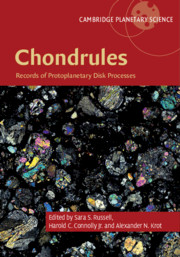Book contents
- Chondrules
- Cambridge Planetary Science
- Chondrules
- Copyright page
- Contents
- Contributors
- 1 Introduction
- Part I Observations of Chondrules
- Part II Possible Chondrule-Forming Mechanisms
- 13 Formation of Chondrules by Planetesimal Collisions
- 14 Making Chondrules by Splashing Molten Planetesimals
- 15 Formation of Chondrules by Shock Waves
- 16 Evaluating Non-Shock, Non-Collisional Models for Chondrule Formation
- 17 Summary of Key Outcomes
- Index
- Plate Section (PDF Only)
- References
14 - Making Chondrules by Splashing Molten Planetesimals
The Dirty Impact Plume Model
from Part II - Possible Chondrule-Forming Mechanisms
Published online by Cambridge University Press: 30 June 2018
- Chondrules
- Cambridge Planetary Science
- Chondrules
- Copyright page
- Contents
- Contributors
- 1 Introduction
- Part I Observations of Chondrules
- Part II Possible Chondrule-Forming Mechanisms
- 13 Formation of Chondrules by Planetesimal Collisions
- 14 Making Chondrules by Splashing Molten Planetesimals
- 15 Formation of Chondrules by Shock Waves
- 16 Evaluating Non-Shock, Non-Collisional Models for Chondrule Formation
- 17 Summary of Key Outcomes
- Index
- Plate Section (PDF Only)
- References
Summary
The antiquity of iron meteorites and the inferred early intense heating by the decay of 26Al suggest that many planetesimals were molten beneath a thin insulating cap at the same time as chondrules were being made. As those planetesimals were colliding and merging, it seems inevitable that impact plumes of droplets from their liquid interiors would have been launched into space and cooled to form chondrules. We call the process splashing; it is quite distinct from making droplets by jetting during hypervelocity impacts. Evidence both for the existence of molten planetesimals, and for the cooling of chondrules within a plume setting, is strong and growing. Detailed petrographic and isotopic features of chondrules, particularly in carbonaceous chondrites (that probably formed beyond the orbit of Jupiter), suggest that the chondrule plume would have been ‘dirty’ and the otherwise uniform droplets would have been contaminated with earlier-formed dust and larger grains from a variety of sources. The contamination possibly accounts for relict grains, for the spread of oxygen isotopes along the primitive chondrule mineral (PCM) line in carbonaceous chondrites, and for the newly recognized nucleosynthetic isotopic complementarity between chondrules and matrix in Allende.
- Type
- Chapter
- Information
- ChondrulesRecords of Protoplanetary Disk Processes, pp. 361 - 374Publisher: Cambridge University PressPrint publication year: 2018
References
- 8
- Cited by

